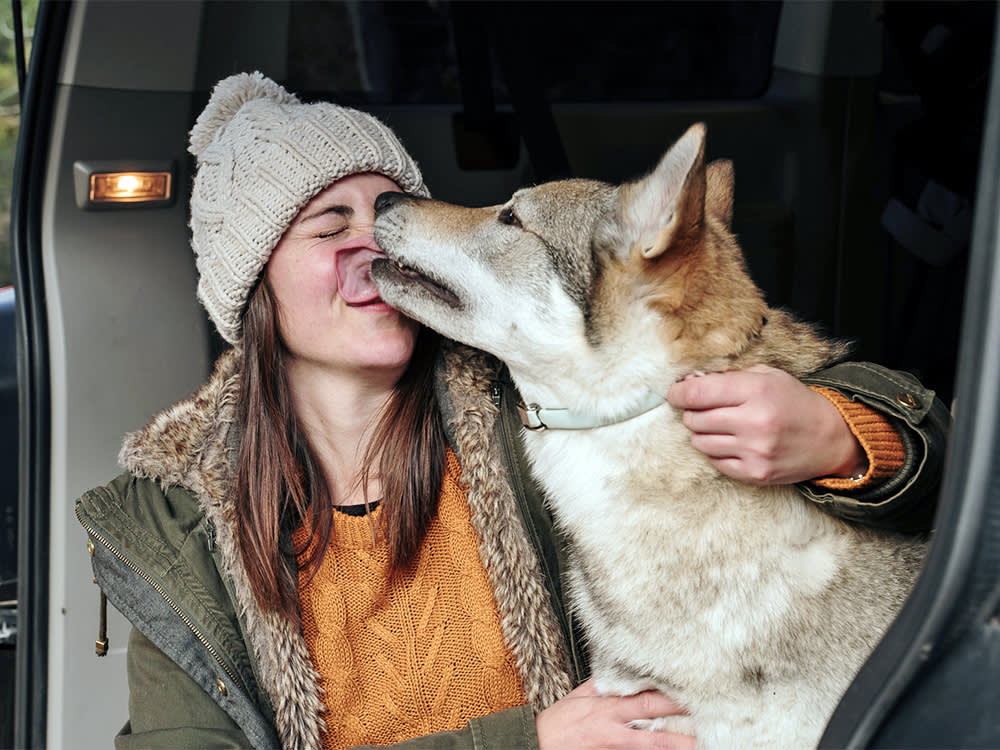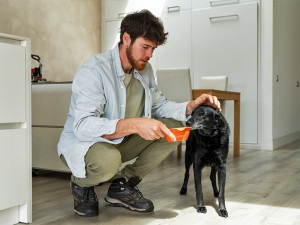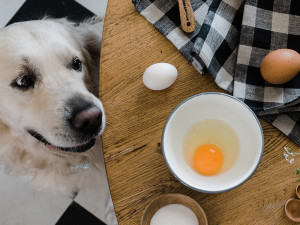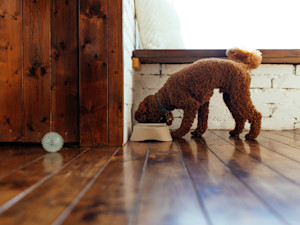Letting Your Dog Lick Your Face Could Be Dangerous, New Study Finds
Dogs can spread antibiotic-resistant salmonella to humans, scientists warn.

Share Article
If you’re used to letting your pup lick your face — and maybe even your mouth, to some of your friends’ horror — you’re far from alone. Most pet parents have a hard time resisting those affectionate “kisses” their dogs bestow…even if they know it’s a little gross. But now, scientists are warning that all that puppy saliva could be seriously dangerous. A new studyopens in a new tab found that household dogs are often overlooked transmitters of salmonella.
Researchers at Penn State University (PSU) found that dogs can carry antibiotic-resistant Salmonellaopens in a new tab, which poses a serious risk to humans; in both dogs and humans, salmonella infections can cause fever, nausea, diarrhea, stomach cramps, and more uncomfortable symptoms. In some cases, according to the Mayo Clinic,opens in a new tab the infection can spread beyond the intestines and cause more serious complications.

Get (totally free) deals for food, treats, accessories, tech, and way more pet parenting must-haves.
opens in a new tabDogs can become sick with salmonella from exposure to the bacteria, often through eating raw food or (sorry) consuming feces from infected animals. Salmonella can be spread to humans through through contact with dogs’ stool or saliva, the U.S. Food and Drug Administration warns. opens in a new tabAnd dogs aren’t always symptomatic while carrying salmonella, meaning that pups may spread it to humans without any warning signs.
The PSU team analyzed salmonella strains found in household dogs between May 2017 and March 2023, as well as human salmonella strains recorded by the National Institute of Health. They found 87 cases of salmonella in dogs, and they concluded that 77 cases of salmonella in humans may have come from contact with dogs. Each strain identified in dogs possessed antimicrobial resistance genes for drugs recommended by the World Health Organization.
The researchers also found that 39 percent of the samples taken from dogs contained a gene that allows Salmonella to survive in the dogs’ intestines. This means that even after the illness passes, they can continue to transmit salmonella through their feces.
The study’s authors add that, although salmonella is not common in dogs, humans’ proximity to dogs makes their findings notable. “Especially with Salmonella, we think about the role of agriculture and transmission — we think about eggs, we think about beef. But the thing is, we don’t let cows sleep in our beds or lick our faces, but we do dogs,” Sophia Kenney, the study’s lead author, said in a statement.opens in a new tab
Nkuchia M’ikanatha, a co-author of the study, adds that hygiene practices can help prevent the spread of salmonella. “This reminds us that simple hygiene practices such as hand washing are needed to protect both our furry friends and ourselves — our dogs are family but even the healthiest pup can carry Salmonella,” M’ikanatha said.
Proper hygiene measures include washing hands frequently, regularly cleaning pet bowls, washing hands after handling dog toys and beds, and — yes, sorry — avoiding letting your pup lick your face. “Several studies highlight the significant physical and mental health benefits of owning a dog, including reduced stress and increased physical activity,” Erika Gandaopens in a new tab, another co-author, added. “Our goal is not to discourage pet ownership but to ensure that people are aware of potential risks and take simple steps, like practicing good hygiene, to keep both their families and their furry companions safe.”

Sio Hornbuckle
Sio Hornbuckle is a writer living in New York City with their cat, Toni Collette.
Related articles
- opens in a new tab
Salmonella in Dogs: Can Dogs Get Salmonella?
What to look out for if they are sick from this bacteria.
![A happy woman is lying on a bed, her dog smelling her face.]() opens in a new tab
opens in a new tab9 Diseases You Can (and Definitely Can’t) Catch From Your Dog
Here’s what you can scratch off your “Worry About This” list.
![Golden retriever looks at some eggs on the counter]() opens in a new tab
opens in a new tabCan Dogs Eat Eggs and Eggshells?
Yes, eggs are a nutritious treat for dogs.
![puppy eating from dog bowl]() opens in a new tab
opens in a new tabNearly 10,000 Pounds of Puppy Food Recalled After Testing Positive for Salmonella
Here's everything you need to know.
- opens in a new tab
Can Dogs Eat Raw Chicken?
They’re definitely curious about what you’re chopping over there on the cutting board...
- opens in a new tab
Can Humans Get Dogs Sick?
Think of the amount of tissues you’d need...





